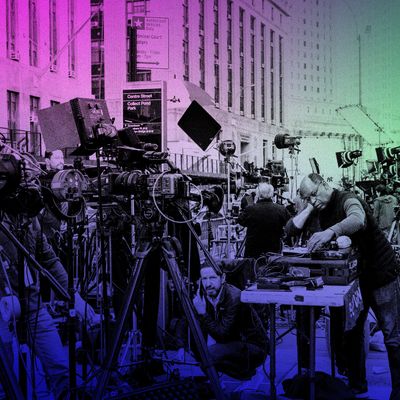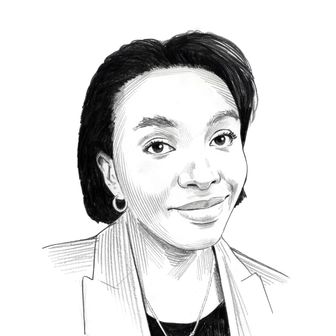
More than six years ago, Wall Street Journal reporters Joe Palazzolo and Michael Rothfeld broke the story that ahead of the 2016 election, former Trump fixer Michael Cohen had facilitated a $130,000 payment to adult film star Stormy Daniels in exchange for her silence about an alleged affair with Donald Trump. Their story won a Pulitzer Prize, and its findings remain central to Manhattan district attorney Alvin Bragg’s case against Trump, which alleges that he altered business records to hide the hush-money payments. After a tortuous path to the courtroom, Trump’s trial begins on Monday.
I spoke to Palazzolo about how Trump’s legal team might approach this case, Michael Cohen’s credibility, and how he feels about having helped set in motion the first criminal prosecution of a former president.
Could you tell me a little about how you and Michael Rothfeld first came to this story?
It goes back to October of 2016. We got a tip that there was a lawyer going around, paying off women. That was the vague thing we had —paying off women who had had sexual relationships with Trump. And that started us down the path that led to the Karen McDougal story, which we published just a couple of days before the 2016 elections, and which said that the Enquirer had paid Karen McDougal, a former Playboy centerfold model, $150,000 for her story for the purposes of tying up the rights and never publishing it. That was when we were introduced to the phrase catch and kill. In the course of reporting that, we also learned about Stormy Daniels. There had been reporting out there already that she and Trump had been seen together at a celebrity golf tournament. We knew that she had very briefly been in talks with media organizations right before the election and then had gone silent. So that was like a loose thread. We mentioned her in the 2016 story, but we didn’t know what’d happened to her at the time. That’s kind of what got the ball rolling for us.
How do you think Trump’s legal team will approach the case against him? Is it about proving the affairs never happened or suggesting that there wasn’t anything untoward about the payments themselves?
My sense is that the question of whether the affairs happened is irrelevant. I don’t know to what extent that Trump’s legal team even wants to delve into that issue. I think that what they will be more interested in doing or more eager to do is to show that the payments themselves didn’t violate any laws or that Trump didn’t violate any laws in the course of these payments.
A big factor in the case is “catch and kill,” the process of a publication buying the rights to an unflattering story in order to prevent it from coming out. It was used to great effect by David Pecker, the former CEO of America Media, Inc which published the National Enquirer. He is expected to testify. How did Pecker’s friendship with Trump lead to this, and what can we expect from his testimony?
I think that Pecker is really important because he can set the table. The district attorney’s office has taken pains to frame this case as more than just about paperwork, right? It’s about, according to them, this scheme in the run-up to the 2016 election to keep information from the public, and Pecker was instrumental in that. He’d known Trump for a long time. They weren’t close friends, but they were associates and they swapped advice, sometimes favors. And Pecker had supported Trump’s other exploratory presidential bids, really pumping him up in the Enquirer. And so when Trump was running for real this time, there was this decision that something more intentional needed to happen. So that’s what led to this meeting that the DA’s office focuses on in 2015, where you have Pecker and Cohen and Trump and, according to the DA’s office, Pecker says something along the lines of “I can be your eyes and ears for the news that comes in about you.” In our reporting, we’ve said that he essentially told Trump, “If any dirt comes up, if any bad stories about you come, we can trap them. We pay for stories and we can bury them.” That was an extension or the culmination of this relationship that they’d had to that point. Again, they weren’t super-close, but it benefited them both.
A question at the heart of this case is the credibility of Michael Cohen, who will be testifying. When he responded to your initial reporting, Cohen gave a very strong denial of everything, only to later change his story and tone quite dramatically. How big a liability is Cohen’s reversal?
Trump’s defense team has made it very clear that his credibility is something that they’re going to target relentlessly. In my conversations with law-enforcement officials and experts — usually, when you have a cooperating witness, they’re not perfect. It’s very rare that you have someone who’s working with a case who participated in the crime who was blemish-free. His credibility is certainly going to be a central issue, but the credibility of cooperating witnesses has long been an issue in cases and I don’t think that it’s insurmountable for Bragg’s side.
Is it possible that this is an issue with Stormy Daniels, too? Initially, she did sign a statement denying everything and has obviously since changed her story on that.
I’m not sure that they’re going to call her as a witness. I know that she’s sort of discussed it, but I’m not sure if it’s actually going to happen. What they’re focusing on is the agreement and the aftermath. I don’t even know how deeply they would go into what happened in 2006, when she says that they had that sexual encounter. I assume they’re more interested in her efforts to sell her story and how it came about and how she wound up getting $130,000 from Michael Cohen. In that case, I think that there are a lot of others who could support her, whether there’s a credibility issue or not. Her lawyer at the time, Keith Davidson; Dylan Howard was kind of involved in those conversations around the payment, even though American Media wasn’t ultimately involved in the Stormy Daniels payment; David Pecker. I just think that there’s enough there that the credibility issue about Stormy or any credibility issues are less important.
What has it been like for you, personally, to write a story that ended up resulting in the first criminal trial of a former president in U.S. history?
Unexpected. I certainly had no idea back in 2016 when Michael and I started reporting on the Karen McDougal agreement that we were going to unearth everything that we did. It’s wild to me that we’re still talking about it five years later. I haven’t given too much thought to it because everything that happened in the story has been so unexpected, that every step of the way we have these “Oh, wow,” moments. So, this is just sort of another in a series of “Oh, wow,” moments for me.
I think early on, we weren’t sure that we were going to be able to connect Trump and people close to him so closely to the payments. With the first Pecker story, we had strong suspicions that Michael Cohen or someone else working for Trump had been in touch with AMI. But getting that reporting was going to be hard and we didn’t even know if we were going to be able to figure out what ultimately happened with the Stormy Daniels payments. So, you write that first story and you’re writing that the President’s personal attorney paid hush money to an adult film star and director. That in and of itself, is not something that I ever expected to be writing as a reporter for The Wall Street Journal. But ultimately, in our minds, this was a story about money and about a public official and that public official’s character.
Other than Daniels and Cohen, what will you be looking for in this trial?
First of all, David Pecker is really interesting. He has never spoken about this. I mean, he’s obviously discussed it with law enforcement and lawyers, but his testimony about his various communications with Trump around these deals is going to be really interesting to me, because we have pieced it together over time and reported on it, but hearing it from him directly in a public setting — I’m hoping that it may reveal something that I didn’t know. I’m really interested in hearing witnesses discuss their communications with Trump about the deal. I want to see and hear in a public setting how closely he was involved, the extent to which this mattered to him in this really dangerous time for his campaign.
I assume you’ll be in the room?
I hope to be. I’m working with a team, and they’re actually taking the lead, and I’ll fill in for them in the courts and help with some things. But I’ve moved on a little bit in my job. Or tried to, but it pulls me back in. Not that I’m upset about that in any way.
This interview has been edited for length and clarity.






























